Lonely Heart
|
COMMENTS
Lonely Heart
|
COMMENTS
In the un-humbled opinion of one, Poetic Justice...
JUSTICE FOR
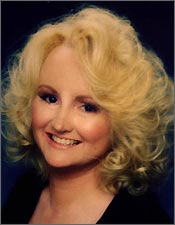
LEE
BONNY
AND JUSTICE FOR ALL
"What do you think a life is worth?"
-- juror
The erstwhile BARETTA dodged a bullet at his criminal
trial, but on Friday, November 18, 2005, jurors in the civil trial
found Robert Blake responsible for the evil murder of Bonny Lee Bakley. Repulsive
defense arguments suggesting the victim's life had no worth were completely
rejected.
Blake's bodyguard - handyman - chauffeur - pool boy, Earl S. Caldwell, was
not held accountable for his deep involvement in the conspiracy to kill Bakley
on May 4, 2001 -- but in a 10 to 2 vote, the L.A. County jury found Blake
financially liable. Sending a powerful message about the worth of Bonny Bakley's
life, they assessed an extremely high damage amount.
Scum of the earth, scam artist, low-life, wife-murderer, Michael
Gubitosi was ordered to pay Bonny Bakley's children
30 million
dollars.
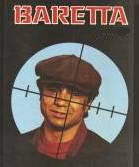
"It's a good day for
justice."
-- superhero, Eric Dubin
Lonely Heart Attack

"You swore to me. You promised
me. You promised . . .
You said, 'don't worry Robert,
no matter what, I'll have an abortion.' That was all a lie. Not a little
lie. That's a big lie. That's the kind of lie that God looks down on and
says, 'Hey, wait a minute. Wait a minute.' That's a big, awful, deep, vicious
lie. They don't get any worse than that."
-- Blake's recorded
phone conversation with Bakley
November 15, 2005
On his seventh and last day of testimony, Robert Blake's
nine man / three women jury saw the bitter old has-been at his worst. Having
backed himself into a guilty corner, Blake began to make open promises of
revenge. He threatened all those who had dared to testify against him. "I
will enter their lives and teach them some manners," the defendant snarled.
Blake would later tell reporters that it wasn't really a threat. During a
recess he said, "But if someone disrespects my family, I'm going to deal
with it."
Jurors also heard Blake repeatedly threaten Eric Dubin. "Don't get cute
with me, chief, or we're going to start talking about your personal life,"
Blake vowed. "I know a lot about you, and what I don't know I can lie
about."
"Is that a threat?" Dubin asked, and Blake blasted back:
"It's not a threat, it's
a promise!"
The jurors themselves witnessed the insane, murderous rage of the bully that
lurks beneath the actor's gruff but harmless public mask. They heard him.
They saw him with their own eyes -- not "Baretta" or "Robert Blake" -- but
Michael Gubitosi, the pathetic killer clown who repeatedly promised to murder
Bonny Lee Bakley and finally did.
"And he who remembers this
when he sees any one whose
vision is perplexed and weak, will not be too ready to laugh;
He will first ask whether that soul of man has come out of the
brighter light, and is unable to see because unaccustomed
to the dark, or having turned from darkness to the day
is dazzled by excess of light.
-- from Plato's
Republic
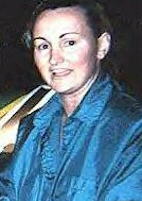
Snuffed
Out
October 8, 2005
The fight was fun for a few rounds, but by his fourth
day of his testimony, Robert Blake had completely run out of punch lines.
Having ticked through his entire repertoire of snappy come-backs and boilerplate
barbs in the first couple of days, the Old Buzzard spent most of his last
afternoon on the stand in a permanent slouch -- quietly mumbling responses
to Eric Dubin's heavyweight interrogation.
In his final hour under oath -- under questioning from his own attorney --
the Emmy Award-winning actor explained to jurors that he was just an innocent,
lonely old man who was tricked into marriage by Bonny Bakley. In hushed tones,
Blake said, "I didn't have much of a life. My kids were grown and gone.
I was very, very single -- a loner."
Day One he couldn't shut up, but by Day Four, Blake could barely raise his
voice above a whisper to speak in his own defense. Ironically, his answers
were so soft and muddled, the court reporter he'd previously commanded to
read back testimony, twice had to command Blake to speak up.
Then, moving beyond irony to something approaching poetic justice, Robert
Blake became one of a very few people during this entire sorry saga to illuminate
some of the true personality of the much maligned dead victim. Regardless
of his motives for doing so, Blake revealed to jurors that Bonny Lee Bakley
was an extraordinary person. He described her as talkative, cunning, smart
and charming. "Bonny liked to talk . . . She was extremely intelligent.
I would guess her IQ at 150."
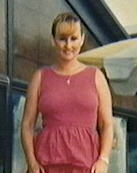
In spite of himself, the Old Buzzard also testified
about something that no one else -- including prosecutor Samuels -- was ever
willing or able to place on the official record. "I loved Bonny and I
always prayed that God would find a way to sneak in there and get a little
light in her life," Blake offered. "I thought that a great deal of
her life would just kind of fall off as baggage."
Even a broken old clock is occasionally right, and at that one moment --
Blake got it just right.
Bonny Lee Bakley is not the sum of her shortcomings and her baggage, she
is the total of her glorious potential. Bonny was a brilliant woman with
an indomitable spirit who fought against the darkness to bring inspiration
and laughter, love and life to this world.
Whether or not she herself deserved to have just "a little light" in a long,
desperate life of sexual violence and emotional abuse, is subject for prayer.
Legally speaking, Bonny Bakley was a human being. She deserved to live her
life.
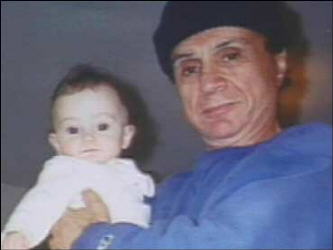
"I will get on the phone and talk to Rosie
and Larry King
will have a hook-up so that everybody in America can hear
me talk to Rosie . . . Don't let it look like a performance."
-- Robert Blake to his publicist
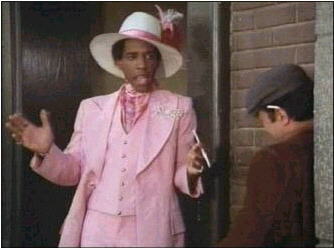
Pimp My
Trial
October 3, 2005
No, that isn't the ghost of Rooster the Pimp sneaking
up behind Robert Blake -- it's O.J. Simpson celebrating the haunting
10th anniversary of getting away with murdering his wife Nicole.
Many of the articles about Blake's second day on the stand mention that it
happened on the eerie October 3, 1995 anniversary of Simpson's acquittal.
Before Robert Blake's criminal trial, he brainstormed with his publicist
about other 1970s TV stars who could be cast as friends spontaneously speaking
out in his defense. In a taped phone call from jail, Blake instructs: "You
call another one and say, 'Would you come to the courthouse with us one time
and afterward go out and talk to the public?'"
A galaxy of faded stars made the wish list of witnesses in the court of public
opinion, including Suzanne Pleshette ("Bob Newhart Show"), Lindsay Wagner
("Bionic Woman"), and Gavin MacLeod ("The Love Boat").
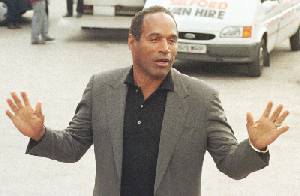
It's dreadfully obvious why Blake never mentioned O.J. Simpson ("Juice on
the Loose," "Naked Gun," "Roots," "A Killing Affair," "No Place to Hide").
There's seemingly no end to similarities between the two homicidal
has-beens:
Both initially had successful careers, but refusing
to leave the limelight gracefully, descended into a world of made-for-TV
mediocrity, stubbornly re-surfacing in the dim glow of B-list projects as
a distorted cliche of their former self.
Both are control freaks who went to extreme lengths
to terrorize and torture their wives.
Both men have an entitlement problem which causes them
to place the value of their pride above the value of another human being's
life.
Both are notorious liars, universally suspected of
criminality and universally shunned.
Both men, while acquitted of criminal murder charges, are certainly guilty of murdering the memory of their slain wife, abusing the trust of family and associates, and bringing shame and disgrace upon the very nation that once supported and celebrated them.
BLAKE UNDER OATH
"Well, if he [Dubin] can get dramatic, I can get dramatic. I get paid to
do it."
"You have an elaborate imagination, sir."
"Counselor, get yourself together."
"Don't put words in my mouth, junior."
"Objection! . . . Sustained!"
"Sometimes he [Ezzell] talks when he shouldn't, and sometimes he don't when
he should."
"I never said I don't know how to use one [cell phone] . . . I said I don't
like to use them."
"We got married to get to know each other and see if we could make it together."
"It was the best thing for Rosie."
"Liar! . . . That's a lie!"
"I could easily have been venting and saying things. When I'm angry, I run
my mouth."
"Don't get cute."
"[William Welch] was a member of robbery homicide for 19 years and he
mysteriously retired one year before his pension and nobody has ever found
out why. I have only one or two facts that make me believe he may be in the
cops' pockets."
"There's a whole gang of stuff that I never said to you, boss, a whole gang
of stuff."
"There were some strange things happening in front of my house that concerned
me . . . Stunt guys, men and women, they take care of their own . . . I told
Duffy what the problem was, and it was my understanding that he'd take care
of it."
"Duffy said if he was going to do the job - intimidate whoever it was hanging
out in front of my house - Duffy didn't want any connection with me in case
there was any trouble with the police. He said, 'Nothing can revert back
to you if I have to get a little tense with somebody.'"
"I gave her [Bonny Bakley] $125,000 or $135,000 over a short period of time."
"I had the intention of giving her all the money she needed, so she wouldn't
have to be in her business anymore."
"There aren't many women who will simply sleep with you and get on the bus,
if you know what I mean . . . With Bonny, pathetically, a part of me required
that, you know, 'Help me make it through the night, and I'll see you later.'
"
"I guess I figured if something was going to put me in the bone orchard it
wouldn't be venereal disease. I'm not comfortable with condoms anyway. Sex
doesn't go well."
"I loved Bonny, and I always prayed that God would sneak in there and get
a little light in her life."
"She could get a rock to follow her down the road if she wanted to. She could
charm the eyes out of a rattlesnake."
"There was a clear understanding that Rosie belonged to me and Bonny. She
was ours, and we were going to raise her."
"She introduced her as her daughter and kind of teased around and said, 'Well,
I guess you probably think she's a lot prettier than me. You'd probably like
to see her more than me.' Holly left the room. And Bonny said, 'You know,
you really could have sex with her. She's the right age.' . . . We just dropped
the whole subject."
"I was an old man, and here was this woman who offered me up her own daughter
[Gawron]. I just couldn't see any good coming out of it at all."
"When Rosie was two weeks old, I promised God. Rosie had changed my life,
and Bonny had given me Rosie. It would be my pleasure to give her a good
life."
"I just felt different about a lot of things. There was just a whole big
rush of emotion. I held her and pretty soon me and Bonny were walking down
the hallway. But I wasn't me and she wasn't Bonny there were just two people
who had a baby. I felt blessed. I felt young. I felt that God had given me
a new lease in life. Like a light comes on."
"Rosie had saved my life and changed my life and gave me a reason to live,
and I had Bonny to thank for that. It would be my pleasure for Bonny to have
a good life for the rest of her life."
"I started feeling affection and fondness for Bonny, and a while later I
admitted to myself that I loved her. She had given me the greatest gift that
anyone could have ever offered me on the planet."
"I shook Bonny with my right hand and said, 'Wake up, toots. And I saw drops
of blood from her nose and maybe a little bit from her mouth."
"That blood was not there [on the car console]. I'm not blind. The light
was on. That blood was not there."
"Is it true I had no blood on my clothes following the night of the killing?
I think that was what was determined by the, uh, forensic, uh, yadda-yadda."
"It never occurred to me [to drive back to Vitello's]. And it probably wouldn't
have been a good idea any way, because you'd have to double-park."
| Plot
Device
Japanese film maker,
Akira
Kurosawa's
remarkable 1950 movie,
ROSHOMON, examines the elusive nature
of truth by telling one story with four different plots. The central incident
involves the rape of a woman (Machiko Kyo) and the murder of a man (Masayuki
Mori), possibly by a bandit (Toshiro Mifune).
|
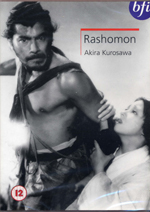
My Own Private Roshomon
Combative Blake Takes
Stand
September 29,
2005
It's difficult to tell from news reports exactly
how jurors reacted to the first day of testimony from accused wife-murderer,
Michael James Gubitosi -- AKA Robert Blake.
Were they amused when he dodged a cascade of questions coming fast and furiously
from Eric Dubin? Asked whether he originally told police he deliberately
put his revolver on the floor under his table at Vitello's, not on the seat,
Blake ducked for cover.
"I have a vague recollection of that mess," he testified. "I was doing the
best I could. If I said 'under' instead of 'on' -- shoot me."
("No, thank you," Dubin responded.)
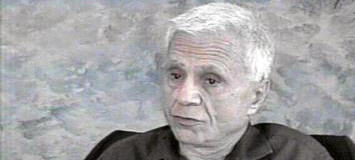
Was the Bakley family's jury shocked as the old TV star repeatedly ordered
the court reporter to read back his statements?
One account says "jurors gasped" when during the third hour of testimony,
Blake lost it and pounced on both Dubin and his own attorney, Peter Ezzell.
Speaking over Ezzell's objections, Dubin asked, "How many times would you
say you changed your story on the night your wife was murdered?"
"Let me answer that, boss," Blake told Ezzell.
"I think I'm kind of a little bit in my own
'Roshomon,'
but I'm going to get it done. If you ask me a question that may sound simple
to the whole world about how many versions there are about this, I'd have
to say there are versions -- because I'm 72 years old . . . I'm not a machine
and I'm dyslexic . . . It's not like a script and an actor."
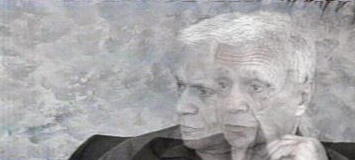
At one point Dubin asked, "Would you
say Caldwell, who was your handyman, had a hobby of murder?"
"No," Blake shouted, "and whoever said that I will say they are rotten, foul
liars to the core."
Were jurors finally as disgusted as Judge David Schachter must have been
when forced to intervene?
DUBIN: "You having fun?"
BLAKE: "I beg your pardon, sir."
JUDGE SCHACHTER: "Stop!"
But the show must go on. In fact, Blake has just begun, so I hope the jury
is relaxed and taking it all in very carefully. Baretta is expected to be
on the stand until the end of next week with fascinating new versions of
his murder every day.
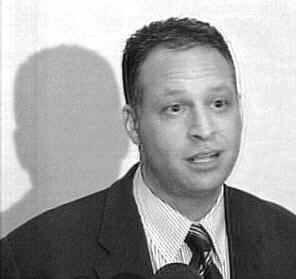
The Wrongful Death
of Bonny Lee Bakley
"Regardless of what she
did for a living, Bonny loved her kids and her kids loved her. I ask you
to listen to her kids and not the lawyers."
-- Eric Dubin, opening statement
"It's because of Bonny that Rosie was born. It was her will, her conviction, not mine, her dedication that brought Rosie into this world, and for that I thank God and I thank Bonny. I stand here before God and I make this pledge that as long as he gives me breath I will do everything I can to make our daughter Rosie's life the best I can."
-- Robert Blake, May 2001
The wrongful-death suit against Robert Blake lists
Bonny Bakley's four children as Glenn Paul Gawron and Holly Lee
Gawron from a previous marriage, daughter Jeri Lee Lewis, and
Rose Lenore Sophia, her daughter with Blake.
![]()
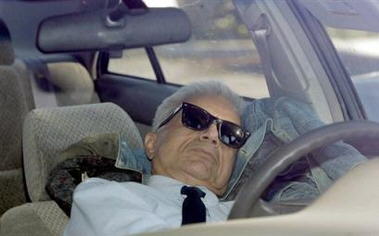
BLAKE SHOT IN CAR
On Thursday, September 1, 2005, just before opening
statements in his civil trial were to begin, Robert Blake was shot in the
front seat of his car. Slumped to the side, a camera man caught the Hollywood
has-been just as he was beginning another nightmare.
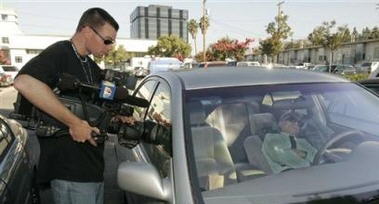
"Bakley's history of pornography, prostitution and fraud as a way of life
were simply staggering . . . and they would have set a horrendous example
for any child."
-- Peter Ezzell
"Robert Blake will tell
you he was shocked tremendously by what he saw."
-- Peter Ezzell
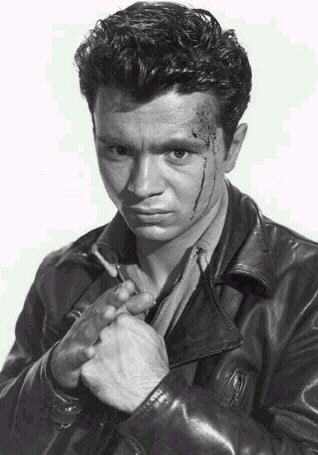
The Civil War Begins
August 24, 2005
Prosecutor Shellie Samuels was unable to convince jurors that
Robert Blake's laughable story about momentarily leaving his wife to retrieve
his gun and returning to find she'd been shot was a painfully ridiculous
lie. Samuels failed to get the triers of the facts to appreciate the
fact that the ever-smiling Blake had, for months, gleefully plotted to murder
his hated wife, only to weep and wail like a little lost puppy once she'd
been murdered.
Perhaps the prosecutor lost her case because she portrayed the defendant's
wife, Bonny Lee Bakley, as someone who deserved to be killed.
Whatever the reason for juror's doubts about the infamous actor's grade-B
murder plot, their "Not Guilty" verdict didn't bring an end to Blake's legal
battles. He's now the subject of a
wrongful
death civil lawsuit brought by Bakley's family.
Eric Dubin, the lawyer for the victim's family, recently made
a promise to BARETTA'S fans: "I'm going to wipe that smile off his
face." He said the family felt Bonny, portrayed in court as a low-life
grifter, had been murdered twice -- "once in the car and once on the stand."
The civil case will certainly be an up-hill battle, but unlike the criminal
trial, the incline won't be nearly so steep. For one thing, the verdict in
a civil trial is based on the "preponderance of evidence," a far lower standard
than a criminal trial where a case must be proven "beyond reasonable doubt."
Another difference is that the jury's verdict doesn't have to be unanimous.
Also of course, in the civil trial -- Robert Blake will not be able to hide
behind his lawyer's performance. He'll be forced to take center stage himself
and testify to what he knows about his wife's brutal assassination.
In what amounted to dress rehearsals for the upcoming court battle, Eric
Dubin spent over eight hours questioning Blake in late May. It was all caught
on camera and apparently the tapes feature more dramatic moments than an
entire season of "SERPICO." During the deposition, the Old Buzzard rants,
raves, twists and shouts while repeatedly denying he whacked his wife. At
one point, after several demands for Mr. Dubin to "shut up," BARETTA threatens,
"don't get cute with me!"
"He definitely was abusive toward me," Dubin told reporters. "But
that's okay. I represent four kids whose mom was murdered. I could care less
if Robert Blake wants to call me names."
Like so many lawyers before him, M. Gerald Schwartzbach has
quietly dropped out of the picture. In his role is Blake's newest attorney,
Peter Ezzell (eh-ZEL'). By my count, Mr. Ezzell is lawyer number 6
-- and so far, he's not had an easy time of it. Superior Court Judge David
Schachter has denied requests by Ezzell for a gag order in the case and
also refused to seal records.
Eric Dubin insists he's ready to do battle. "Robert Blake realizes the
importance to his future acting prospects of not being proven a murderer
in a court of law," Dubin said. "He also wants to avoid the stigma
that O.J. Simpson got after his civil conviction."
Assuming there will be no further delays, the civil war begins August 29.
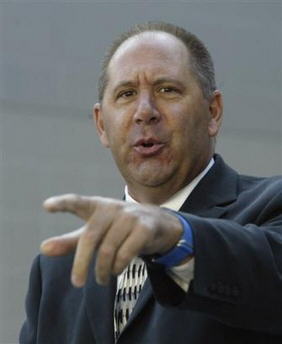
co-defendant, Earle
Caldwell
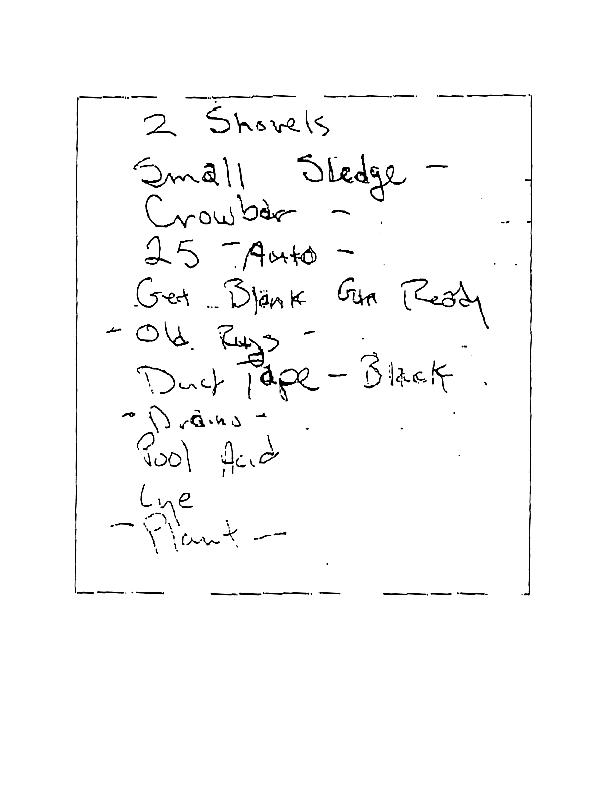
![]()
"But the truth is not always
easy to find and not always easy to accept.
. . . Sometimes judgment is turned away backward, justice stands far off,
and truth is fallen in the street."
-- David Rimmer
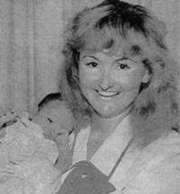
On March 16, 2005, after nine days of deliberations, a Los Angeles County jury returned a verdict declaring Robert Blake Not Guilty of the first degree murder of Bonny Lee Bakley.
![]()
District Attorney Steve
Cooley said the jurors who acquitted Blake were "incredibly stupid."
"Quite frankly, based on my review of the evidence, he is as guilty as sin.
He is a miserable human being," Cooley said. M. Gerald called Cooley's comments
"small-minded," and juror Chuck Safko said: "To hear him say we aren't a
smart jury is sour grapes. They didn't have a good case. Their case was built
around witnesses who weren't truthful."
Juror,
Roberto Emmerich, didn't
miss a beat. Within 24 hours of acquitting Blake, Roberto began promoting
his new music CD based on Bonny Bakley's murder, at the unfortunately named
website:
"LiveOnWebTV.com".
Blake/Walters interview
on "Good Morning America" March 22,
2005


| WALTERS: "One
of the reporters asked you, 'who do you think DID kill Bonny Lee Bakley'
and you said 'shut up.' I gotta ask you that. Do you have any idea who did
it?"
BLAKE: "What I meant by, 'shut up' is -- I mean, I would like to have everybody stop killing Bonny -- now. Everybody's making a buck on Bonny. It's like America now is -- fill your rice bowl any way you can -- they're still picking Princess Diane's bones." WALTERS: "But do you have any idea who did it, Robert?" BLAKE: "Somebody. . . she led that kind of life where she made a lot of enemies, and, and, and -- somebody -- somebody who's father was taken for a ride or something like that. I don't know. I don't know."
|


Town Without Pity

March 7,
2005
As of this writing, Bonny Lee Bakley is still dead.
She's still buried in Forest Lawn Cemetery serving out the instant death
penalty she was given on May 4, 2001. So it's a mystery why, during her otherwise
first-rate closing argument in the Blake trial, Deputy District Attorney
Shellie Samuels chose to prosecute Bonny Bakley.
Calling her a "small-time grifter" echoes a few other unfortunate, victim-bashing
statements Samuels has made throughout the trial.
If the DA would like to prosecute Bonny that's her prerogative -- but it'll
have to be in absentia. Considering the amount of hate-filled, patriarchal
rhetoric lodged against Bonny in newspapers, television shows and internet
chatrooms, Shellie Samuels could probably get a quick guilty verdict and
have a mock burning of Bakley at the stake.
In the meantime, Samuels needs to get a conviction out of the seven-man,
five-woman jury empanelled to try CA v Robert Blake.
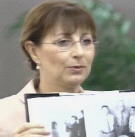
Exhibiting an encyclopedic handle on the facts in
her case, prosecutor Samuels spent three hours summing up the exotic evidence
lodged against Blake in her blunt, forceful style. Readily admitting she
had no eyewitnesses or direct physical evidence linking the tough-guy actor
to the cowardly ambush of Bonny Bakley, Samuels asked jurors to focus on
the circumstantial evidence supplied mainly by Robert Blake through shocking
testimony to cronies, cohorts and hired help.
Like credits rolling at the end of a movie, DA Samuels reviewed Blake's many
murderous stunts as attested to by "a cast of characters straight out
of central casting," and concluded the first part of her PowerPoint
presentation by arguing, "the people have proven what they promised."
Unending Nightmare
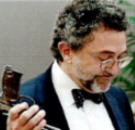
And then -- bowtie in collar and hat in hand -- 5th
understudy defense attorney, M. Gerald Schwartzbach, set sail on a long-winded,
final filibuster. The M. apparently stands for Marathon Monologue.
Blake's reserved, soft-spoken, lawyer reluctantly stepped into the spotlight
-- and then stayed there for two days, emoting about everything from sloppy
police detectives to groomed witnesses.
At one point, Schwartzbach said Blake's plots to whack, snuff and pop his
wife, as relayed by men named, "Whiz Kid" and "Duffy," were simply ridiculous.
"If these guys actually were telling the truth, we ought to have an insanity
defense," Schwartzbach cleverly quipped. Although spoken in jest, he
may have hit on something. It's too bad Schwartzbach wasn't counseling Blake
two years ago when the defendant stood before Superior Court Judge Darlene
Schempp and pled innocent to all charges.
When he finally finished singing Robert's praises, tap dancing on Bonny's
coffin, and delivering melodramatic speeches about malignant witnesses --
Schwartzbach got down on one rhetorical knee and begged. M. Gerald's bespectacled
eyes filled with tears as he recounted Blake's heartache and hardship since
the night his wife was shot in the brain. Adding to Robert's horror, he said,
were foolish police rushing in to judge -- rushing in to destroy him.
O, the pain! O, the suffering! … Oh, the evidence?
"Maybe you think 'He might have done it,' maybe 'He probably did it,'
but it hasn't been proven to you beyond a reasonable doubt," the defense
attorney said. "All I ask you to do, is to do justice. And I respectfully
submit: If you do justice you will end this nightmare for Mr. Blake and you
will give him his life back."
Schwartzbach made no mention of the man who "probably did it" giving Bonny
her life back -- but he seemed desperate enough to promise the jury
anything if it meant they'd come up with an excuse to nullify and
return a verdict other than GUILT.
Kiss My Rebuttal
When the prosecutor rose to give her 75-minute rebuttal,
Schwartzbach turned his chair away in disgust.
DA Samuels easily countered the weak razzle-dazzle of her opponent's arguments
with as many of her matter-of-fact power points as she had time for, then
she pointed directly at the defendant and his absurd alibi.
Schwartzbach sat with his back to Shellie Samuels the entire time, as if
to indicate that the State's prosecutor was unimportant to him. Of course,
Samuels was standing at the jury box, so Blake's defense lawyer -- perhaps
unwittingly -- also conveyed the message that the jurors were unimportant
to him. Based on the quality of his closing argument -- that may well be
the case.
If Schwartzbach's body language spoke louder than words, his client's phony
posing was a nightmare scream of guilt.
Sympathy for the
Buzzard
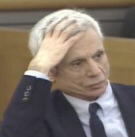
There was a joke circling around a few weeks ago:
Did you hear Robert Blake tried cosmetic surgery? He wanted to get the guilty
look off his face.
Referred to by some as the "Old Buzzard," Robert Blake sat perched at his
defense table in a permanent slouch throughout the week of closings. Other
than the constant pick, pick, picking at his white hair, the Emmy Award winning
has-been sat motionless -- staring blankly into space.
Robert Blake was never a very good actor. He can mock it up and do the schtick,
but it's all mugging and masking. It isn't real. Despite six decades in front
of a camera, Blake's acting fails to convince -- mostly because as you watch
him, you know he's watching himself. He thinks he's really good, which makes
him both a bad actor AND a bad audience.
The wide-eyed, haunted gaze, motionless torso, and absent-minded hair stroking,
is a standard in the industry. (Really bad actors add a palsied hand shake.)
Blake's courtroom character is supposed to recall King Lear -- a role
often played with a distant gaze and hair pulling. Shakespeare's aged King
cries out:
"I am a man more sinned against than sinning."
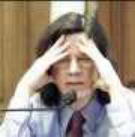
Blake may not know it, but the bizarre character
he's trying to play is also a standard in murder trials. Without a doubt,
the best actor in this category was cross-dressing, millionaire dermatologist
and wife-killer, Dr. Richard Sharpe. Now THERE was hair-picking!
The bizarre buzzard mannerisms are designed to elicit pity and perhaps a
measure of fear, but the reality here is -- very few people feel pity for
Robert Blake. Wedged between Scott Peterson and Michael Jackson, very few
are paying any attention to him at all.
Blake has said he worries he'll only be remembered for playing
Baretta. His worries are over -- in that respect at least.
If Blake is remembered at all, it will be for the stalking, plotting, ambushing
and shooting of his wife and the mother of his child.
It's most fitting that after a miserable lifetime making mediocre movies,
Michael Gubitosi would finish with one, last, really big flop: the premeditated
murder of Bonny Bakley.

"And if you pity the defendant, your pity is misplaced anyway." -- Samuels "If you have learned anything in this trial, you have learned that family is important to him." -- Schwartzbach "Shellie is rolling with the punches. I think [Schwartzbach] doesn’t know how to improvise." -- Eric Dubin, lawyer suing Blake on behalf of Bakley’s children |
Lonely
Heart
Robert Blake's
plot to kill Bonny Lee Bakley
Link to
more Comments - Page 2
| Vance Holmes.com / court |
| And Poetic Justice For All |
Thank You for supporting this site. .
.